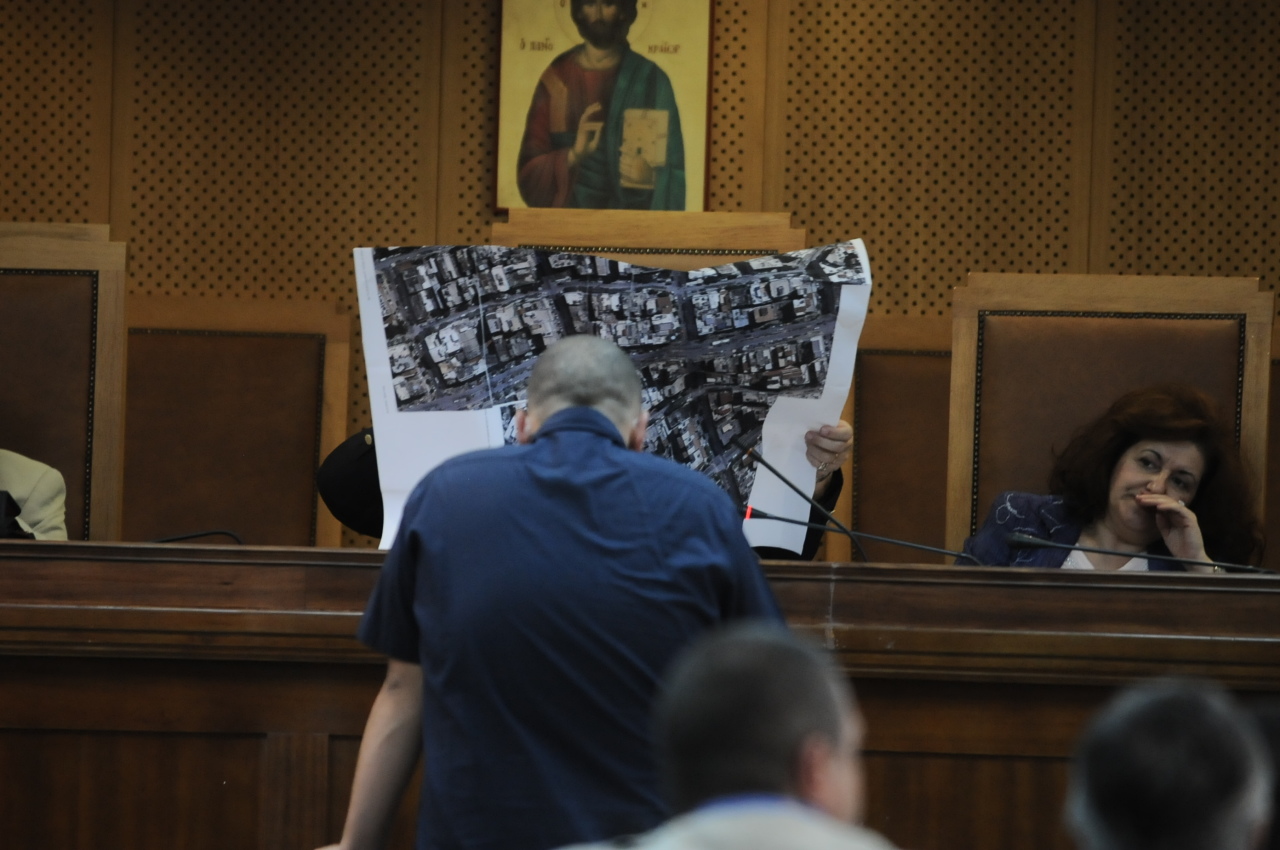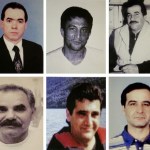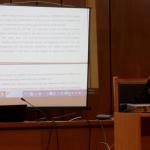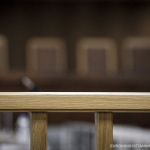20th Hearing, Women’s Section, Korydallos Prisons, Athens, 8 October 2015
1. Court access
Many seats were empty, even though the police authorities now allow access to anyone wishing to follow the trial, provided they present their identity cards upon entering the courtroom. The venue remains the same. It emerged that the large hall in Athens Appeals Court earmarked as the new venue for the trial will now be used for the trial concerning the smuggling of two tonnes of heroin from Dubai to Elefsina on the Noor One. The decision was made at a meeting held at the Supreme Court on the morning of 9 October and chaired by the justice minister and the president of the Supreme Court. The trail’s presiding judge, Maria Lepenioti, also informed the court that those involved in other criminal cases will be asked to suspend their obligations elsewhere so that the current trial can be conducted at least three times a week. She proceeded to announce the scheduled hearing dates for November (4, 6, 10, 12, 18, 19, 24 and 25 November).
2. Presence and representation of the defendants
Thirteen (13) defendants were present at the beginning of the hearing. Ten defendants were listed as absent. The remaining defendants were, for the most part, represented by their counsel; absent counsels were provisionally substituted by their colleagues. The defendant Nikoletta (Nikol) Beneki made her first appearance at the trail.
3. Problem with witness Irini Fyssa
Eleftheria Tompazoglou, counsel for Irini Fyssa who was expected to continue her testimony at the hearing, submitted a medical report that revealed the witness is suffering from an aggressive neurovegetative disorder. As a result of her illness, she will remain bedridden for an indefinite period.
4. Testimony of the eyewitness Pavlos Seirlis: questions from the judge
Presiding Judge: How are you employed?
Pavlos Seirlis: I am an employee in the private sector.
Judge: What was your relationship with Pavlos Fyssas? How often did you see each other?
Seirlis: We were friends. I knew him for six years. We met up regularly.
Judge: Tell us the story.
Seirlis: On 17 September 2013, in the early evening, we talked about watching the match together. At half-time, I saw I had a missed call from him. I called him back. When half-time was over, I was still in another bar – called Souvenir – about 200 meters from where Pavlos was. He told me where he was so we could watch the rest of the match together. We had arranged the whole thing poorly; there was no room for anyone else in Souvenir. There was more space in Koralli [a cafe]. So we – Xypolitos, Melachrinopoulos, Lina, eight people in total – went to find Pavlos there. After we had parked on Pavlou Mela street, we saw a man in a black shirt and combats. He had a really striking tattoo. A party of three sat across from me. I noticed they kept shifting around, sending text messages and looking at us. But we didn’t say anything.
Judge: Who was the man outside? And the other three in the bar?
Seirlis: I recognised Michalaros, the man outside, from the pictures I saw in court in September. Inside, I recognised Aggos and Tsalikis. At one point, Aggos even tripped over me and said sorry. I replied, “I’m sorry, bro.” There were ten of us. We paid and left. As we were leaving, I definitely saw four people and one of them was definitely holding a club. We were terrified. They were wearing black and combats; one of them seemed to be holding a baton.
Judge: There’s a big difference between four and 20 people.
Seirlis: There was no light, but I’m sure I saw four people. One rather small man in a striped shirt told us that he was a policeman. He approached us and told us to leave. We told him we just wanted to get our cars and go; he was moving back and forth between us and the men. We decided to move towards the square on Tsaldari street, have a beer to calm down and then leave. We were afraid. When we got to Tsaldari street, we put one friend, Christos, in a cab; he was ill. A motorcycle police unit showed up as well. Then a silver car drove by. Skarpeli and Baxevanakis sat in the back; Roupakias and a guy with a buzz-cut asked us where they could find Kefallinias street. The rest of them began to threaten us. 30–40 people gathered around us with clubs and began to attack us. I recognised Anadiotis. They came at us from every direction. They hit me with a helmet. They hit Melachrinopoulos as well; he was trapped together with Pavlos. We ran towards Lambraki street. They isolated me but I managed to escape. They chased us through the alleyways; we were looking for places to hide. I saw the silver car again; I saw a man getting out of it, but then I hid. We ran into a ground-floor parking lot beneath an apartment building, chased by men on motorbikes who cursed at us and shouted, “come out of there”. When we saw more policemen arrive, we came out. Though we had called the police earlier and told the policemen that we were the ones being chased, they handcuffed us and drove us to Keratsini police station. I was with Mandas, Xypolitos and Hatziefstratiou. They put us in a room with Roupakias; at the time we had no idea he was Pavlos’ killer. The murderer was at ease; he spoke on the phone and said he hoped we didn’t think he was one of them [a Golden Dawner]. Then he banged on the door and asked the guard to take him somewhere else. Only then did we realise that he was probably the murderer. Melachrinopoulos actually saw Roupakias stabbing Pavlos.
Judge: You said you saw a silver car?
Seirlis: Out of the corner of my eye, yes. No one drives down Tsaldari street in the wrong lane by mistake. It’s like driving the wrong way on the road in front of parliament; it’s a main road.
Judge: What was Pavlos like? His music? His lyrics?
Seirlis: All of us were involved in music; we believe in humanity and we like solidarity. Pavlos was our mentor. He always tried to do good and his work was well-recognised in the hip hop community.
Judge: Did that bring him into conflict with some people?
Seirlis: None of us had ever had an open confrontation with Golden Dawn. We weren’t interested in brawls. I’m not involved in party politics. What I know, and what I learned after Pavlos’ death, is that it’s an organisation of madmen who murder all those who refuse to take their side. They are the descendents of the Nazis. They move like an army: armed, following orders.
Judge: What is an assault division? Is there a chain of command? Does someone lead it?
Seirlis: All of them take orders from their leader; everything is arranged in a hierarchy. Patelis sent a message saying, “everyone at the offices in 15 minutes”. The four men at the bar arranged everything. Lagos is higher ranking than Patelis.
Judge: Do you know of other Golden Dawn activities?
Seirlis: I heard about attacks on the Egyptians, on the [PAME] flyposters and about the Luqman murder.
Prosecutor: Why didn’t you go into the bar? You say it was premeditated? How could they have known that Pavlos would be in Koralli that night?
Seirlis: It was premeditated. But it was by pure chance that they saw Pavlos at Koralli that night. Melachrinopoulos was right next to Pavlos when the attack happened. I’m sure of it; I saw him. We told the girls to run away. Chrysa asked the policemen to help. I think that this particular unit only acts upon receiving orders.
Deputy Prosecutor: You have given three different testimonies.
Seirlis: I was confused, exhausted and afraid. I made my first statement ten hours after the murder. I was trying to put the events in order. The murderer had even had the gall to offer us a cigarette earlier.
Counsel: You said they shouted at you. What did they shout?
Seirlis: “Come on, you chickens! Faggots! Come here, you cunts; we’ll slaughter you.” At some point I turned my head and saw them coming at us. An armed man never has good intentions.
5. Questions from the civil counsel
Giorgos Maragkos (counsel for the Fyssas family): Who was the target of the assault?
Seirlis: Our group of friends.
Maragkos: Why did Roupakias only approach Pavlos? Why was Pavlos the only one stabbed? Why not Melachrinopoulos?
Seirlis: If Melachrinopoulos had been the target, then simply he would be dead now.
Maragkos: Who leads the organisation in the area?
Seirlis: Lagos.
Maragkos: What was the content of Pavlos’ songs?
Seirlis: They were anti-Nazi, antifascist, but there were also love songs as well.
Maragkos: Did Pavlos’ activities bother anyone in the area?
Seirlis: Yes; they definitely bothered Golden Dawn.
Maragkos: You said he was trapped; why did the killer target Pavlos?
Judge: The witness has already answered that question.
***
Andreas Tzelis (counsel for the Fyssas family): Describe the tattoo you mentioned earlier.
Seirlis: It was a meander.
Tzelis: Did the man who approached you encourage you to move in a particular direction?
Seirlis: No.
Tzelis: Were you carrying weapons inside Koralli? Could Golden Dawn have felt threatened by you?
Seirlis: No.
Tzelis: Whom did the police arrest then?
Seirlis: Only Pavlos’ friends.
Tzelis: Did anything come to your attention in the week before Pavlos’ murder?
Seirlis: The other attacks I mentioned.
Tzelis: Were the tactics deployed in the other attacks similar to the ones used in the attack on you?
Seirlis: Yes, there are obvious similarities. I know that they launched an attack on people handing out fliers in my neighbourhood in Rouf. I know of another attack near where I live now, in Petralona, above Pireos street.
***
Chrysa Papadopoulou (counsel for the Fyssas family): How long did you speak with the intermediary?
Seirlis: Fifteen minutes.
Papadopoulou: Did Pavlos direct his humanitarian efforts to Greeks alone in the way Golden Dawn does?
Seirlis: No.
***
Eleftheria Tompatzoglou (counsel for the Fyssas family): Did the policemen who came into the ground-floor parking lot seem to know about the incident already? Did you tell them that you had called them?
Seirlis: Yes, we told them.
Tompatzoglou: How was Roupakias in the cell?
Seirlis: In retrospect, I think he must have been quite anxious; he was texting the whole time.
***
Takis Zotos (counsel for the Egyptian fishermen): You were in another bar. Where was it?
Seirlis: On Salaminas street.
Zotos: When did you first see the motorcycle police unit?
Seirlis: On Tsaldari street.
The judge asked the counsel not to force the witness to repeat himself and to ask questions relevant to his case.
Zotos (showing the witness pictures taken from the hard drives of the defendants, Skarpeli and Patelis): Tell me whether you see a church choir, a group of scouts, party followers or members of a paramilitary unit? Please describe their appearance.
Seirlis: It is a military unit. Military trousers, boots, black shirts, all lined up in order.
***
Thanasis Kampagiannis (counsel for the Egyptian fishermen): Who was the eldest in your group?
Seirlis: Pavlos. I was the second eldest. I was 29 at the time. The attackers were older than us.
Kambagiannis: What kind of combats were the attackers wearing?
Seirlis: Alpine division combats: white, grey, light grey, black.
Kambagiannis showed the witness more pictures and asked if he could recognise any of the faces in the courtroom. The defence objected and Kambagiannis protested that he had every right to ask the question and the court, if it considered that he should not answer, had every right to bar it. The defence argued that the picture was not part of the official evidence.
The judge said that the counsel has the right to display any picture, regardless of whether it is included in the official evidence. She added that the same goes for the defence. The witness recognised the defendant Michalaros.
Kambagiannis: Had the attackers assembled before the assault?
Seirlis: Yes.
***
Kostas Papadakis (counsel for the Egyptian fishermen): How long had Fyssas been writing songs?
Seirlis: 15 years. He made music videos too.
Papadakis: Did you get the impression that these people wanted to create trouble in the cafe?
Seirlis: No.
Papadakis: Did you see the intermediary later at the police station?
Seirlis: No.
***
Haris Stratis (counsel for the PAME trade unionists): Have you seen anything regarding the attack on the PAME trade unionists?
Seirlis: Yes. I watched a video on the internet.
Stratis: What is the video called?
Seirlis: Prick Plebs and Workers.
Stratis: Who says the phrase, “anything that moves is slaughtered”?
Seirlis: Patelis.
Stratis: Does he seem to be wishing something or delivering an order?
Seirlis: Delivering an order.
Stratis: Who is the leader of Golden Dawn?
Seirlis: Michaloliakos.
Stratis: Are other members of Golden Dawn in parliament?
Seirlis: Yes.
Stratis: Do you know what Roupakias said to the policemen who arrested him?
Seirlis: I heard he said, “I am one of you.”
Stratis: At the time, were Lagos and Michaloliakos MPs and the political expression of Golden Dawn?
Seirlis: Yes.
6. Questions from the defence
Giorgos Sotiropoulos (counsel for Ioannis Aggos): How many cars did you have to pick up?
Seirlis: Two.
Sotiropoulos: If it hadn’t been for the intermediary, would you have gone on to Tsaldari street?
Seirlis: Yes. Out of fear.
Sotiropoulos: If there was no confrontation in Koralli, why did this man come and tell you to leave?
Seirlis: He had probably seen what was going on outside.
Sotiropoulos: What time did you leave Koralli? In your testimony in Piraeus you said you left Koralli five minutes before the murder.
Seirlis: The match had ended.
Sotiropoulos: How far were you from the spot of the murder?
Seirlis: 30–40 meters.
Sotiropoulos: In the little time in which you were running, you managed to discern that it was an organised group pursuing you?
Seirlis: Yes. It was clear from the way they were moving.
***
N. Kontovazenitis (counsel for Anastasios Anadiotis): Where were you while the Roupakias–Fyssas fight was going on?
Seirlis: In the ground-floor parking lot.
Kontovazenitis: Do you remember the street name and number?
Seirlis: No, it was two alleys down.
Kontovazenitis: Were you shown many pictures of Anadiotis? Full-length or portrait?
Seirlis: Many were full-length. Anadiotis was probably the one who beat me.
Kontovazenitis: How far from the murder [scene] did Anadiotis allegedly beat you?
Seirlis: 5–10 meters.
Kontovazenitis: What was the name of the bar you were at before?
Seirlis: Souvenir.
Kontovazenitis: Were you there from the beginning of the match?
Seirlis: Yes.
***
Dimitra Velentza (counsel for Ioannis Kazantzoglou, Elpidoforos Kalaritis and Aristotelis Chrysafitis): Were there lots of people on Tzaldari street?
Seirlis: Yes, but not an unusual number.
Velentza: How was the weather?
Seirlis: Fair.
Velentza: What were you wearing?
Seirlis: A white top and shorts.
Velentza: What colour were the shorts?
Seirlis: Denim.
Velentza: How did you walk from Koralli towards Tsaldari street?
Seirlis: At a steady pace.
Velentza: How quickly did you find a cab for your sick friend?
Seirlis: Immediately.
Velentza: What did he have?
Judge: That’s a different question.
Velentza: In your testimony you didn’t say that they said “Come here [and] …”, you said they said “Come on, you chickens”.
Seirlis: As I told you earlier, I hadn’t slept and was terrified and all I could think about was Pavlos’ funeral.
***
Vasilis Oplantzakis (counsel for Ioannis Kazantzoglou) produced maps of the area with which to examine the witness. The counsels stood up to get a better look. At this stage, Takis Zotos turned to the judge and said, “You realise that if you had let us have a projector in here…”
Oplantzakis pointed out Tsaldaris street on the map while the defence counsel objected to the reporters who were trying to get a shot of the lawyers crowded around the maps.
Oplantzakis: What time did you leave Souvenir and why?
Seirlis: So we could join the others and spend the evening together.
Oplantzakis: In your testimony on 18 September [2013] you said that one of the four men was carrying a plank. Was there a building site close by?
Seirlis: I don’t know.
Oplantzakis: If there were four of them and nine of you, why didn’t you take your cars and leave.
Seirlis: We saw they were armed.
Oplantzakis: But you’re strong; why didn’t you defend your friend?
Seirlis: I was afraid.
Oplantzakis: Look at Mr Kazantzoglou (he makes the defendant stand); do you recognise him?
Seirlis: No.
Oplantzakis: Please let that be entered in the record.
***
Ioannis Pagonas (counsel for Ioannis Komianos): Did any of the men in the motorcycle gang follow you?
Seirlis: Yes.
Pagonas: Who?
Seirlis: I don’t know.
***
Christoforos Tsagkas (counsel for Anastasios Michalaros): Did you keep in touch with the others after the crime?
Seirlis: No. I started a family.
Tsagkas: With whom from your group of friends did you run away [that night]?
Seirlis: I helped one person and then I left on my own.
Tsagkas: When you saw Roupakias at the police station, did you recognise him as the man in the car?
Seirlis: No.
***
Dimitris Gavelas: When did you see the video of Patelis?
Seirlis: Two or three days ago.
Gavelas: Did you try to find out if the video refers to a particular incident and whether the things you saw actually took place?
Eleni Zafiriou (counsel for the PAME trade unionists): You mean, did he find out whether they slaughtered anything that moved?
Seirlis: You mean murder? No, I didn’t look into it.
***
Giorgos Roumpekas (counsel for Giorgos Roupakias): What impression did you get from the looks the others gave you? Simple? Threatening? Why did you mention movements?
Seirlis: I saw them sending messages the whole time.
Roumpekas: Were you watching the match or the people sitting across from you?
Seirlis: The match and my friends.
Roumpekas: So what did you end up actually watching? Why did you go there?
Judge: Couldn’t he have been watching everything?
Roumpekas: Was Koralli a big place?
Seirlis: I don’t remember.
Roumpekas: Are the pavements on Tsaldaris street narrow or wide?
Seirlis: Wide
Roumpekas: Why were you on the outside rather than the inside of the pavement?
Seirlis: We just ran.
Roumpekas: You told the investigating magistrate about blows to your head and arms. In the pretrial investigation, you said you didn’t remember the blows. Which is the truth?
Seirlis: The truth is that I was thinking about my friend’s funeral.
Roumpekas: How is it that you could recognise Roupakias six months later but not at the police station immediately afterwards.
Judge: Mr Roumpekas, what is your client’s position?
At this point, Andreas Tzelis (counsel for the Fyssas family) stood up, clearly irritated. As he walked out in protest, Panagiotis Michalolias (counsel for Nikos Michaloliakos) mumbled, “You’re a clown.” Eleftheria Tompatzoglou (counsel for the Fyssas family) stood up, turned on the microphone and told to the court: “Mr Michalolias referred to Tzelis as a clown.”
When Mr Michalolias proceeded to deny he had uttered the phrase about Mr Tzelis, Ms Tombazoglou said: “So you are cowards as well as fascists.”
The trial was adjourned amid this commotion. The next hearing was scheduled for Tuesday, 13 October 2015.









